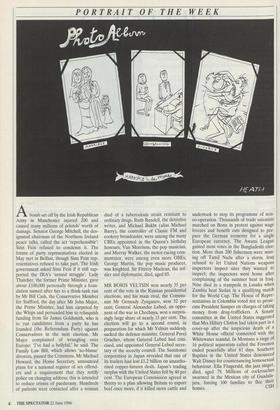PORTRAIT OF THE WEEK
Abomb set off by the Irish Republican Army in Manchester injured 200 and caused many millions of pOunds' worth of damage. Senator George Mitchell, the des- ignated chairman of the Northern Ireland peace talks, called the act 'reprehensible'; Sinn Fein refused to condemn it. The forum of party representatives elected in May met in Belfast, though Sinn Fein rep- resentatives refused to take part. The Irish government asked Sinn Fein if it still sup- ported the IRA's 'armed struggle'. Lady Thatcher, the former Prime Minister, gave about £100,000 personally through a foun- dation named after her to a think-tank run by Mr Bill Cash, the Conservative Member for Stafford, the day after Mr John Major, the Prime Minister, had him carpeted by the Whips and persuaded him to relinquish funding from Sir James Goldsmith, who is to run candidates from a party he has founded (the Referendum Party) against Conservatives in the next election. Mr Major complained of wrangling over Europe: 'I've had a bellyful,' he said. The Family Law Bill, which allows 'no-blame' divorces, passed the Commons. Mr Michael Howard, the Home Secretary, announced plans for a national register of sex offend- ers and a requirement that they notify police on changing address; this is intended to reduce crimes of paederasty. Hundreds of patients were contacted after a woman died of a tuberculosis strain resistant to ordinary drugs. Ruth Rendell, the detective writer, and Michael Bukht (alias Michael Barry), the controller of Classic FM and cookery broadcaster, were among the many CBEs appointed in the Queen's birthday honours; Van Morrison, the pop musician, and Murray Walker, the motor-racing com- mentator, were among even more OBEs; George Martin, the pop music producer, was knighted. Sir Fitzroy Maclean, the sol- dier and diplomatist, died, aged 85.
MR BORIS YELTSIN won nearly 35 per cent of the vote in the Russian presidential elections, and his main rival, the Commu- nist Mr Gennady Zyuganov, won 32 per cent; General Alexander Lebed, an oppo- nent of the war in Chechnya, won a surpris- ingly large share of nearly 15 per cent. The election will go to a second round, in preparation for which Mr Yeltsin suddenly sacked the defence minister, General Pavel Grachev, whom General Lebed had criti- cised, and appointed General Lebed secre- tary of the security council. The Sumitomo corporation in Japan revealed that one of its traders had lost £1.2 billion on unautho- rised copper-futures deals. Japan's trading surplus with the United States fell by 40 per cent. The European Commission agreed in theory to a plan allowing Britain to export beef once more, if it killed more cattle and undertook to stop its programme of non- co-operation. Thousands of trade unionists marched on Bonn in protest against wage freezes and benefit cuts designed to pre- pare the German economy for a single European currency. The Awami League gained most votes in the Bangladeshi elec- tion. More than 200 fishermen were miss- ing off Tamil Nadu after a storm. Iraq refused to let United Nations weapons inspectors inspect sites they wanted to inspect; the inspectors went home after complaining of the summer heat in Iraq. Nine died in a stampede in Lusaka when Zambia beat Sudan in a qualifying match for the World Cup. The House of Repre- sentatives in Colombia voted not to prose- cute President Samper on charges of taking money from drug-traffickers. A Senate committee in the United States suggested that Mrs Hillary Clinton had taken part in a cover-up after the suspicious death of a White House official connected with the Whitewater scandal. In Montana a siege of 16 political separatists called the Freemen ended peacefully after 81 days. Southern Baptists in the United States denounced Walt Disney for countenancing homosexual behaviour. Ella Fitzgerald, the jazz singer, died, aged 79. Millions of cockroaches swarmed in the Mexican city of Guadala- jara, forcing 100 families to flee their


























































 Previous page
Previous page